- HOME
- SYMPOSIUM & SEMINAR
- 第137回IROASTセミナー開催のお知らせ The 137th IROAST Seminar
SYMPOSIUM & SEMINAR
(Report報告)The 137th IROAST Seminar was held 第137回IROASTセミナーが開催されました
2024年12月11日、峯 洋二 教授(大学院先端科学研究部)が世話人となり、鄭 玉峰(ZHENG Yufeng) IROAST卓越教授(北京大学・中国)をお迎えし、第137回IROASTセミナーが開催されました。
今回のセミナーでZheng教授は、「再生医療のための高強度生分解性金属の開発」に関する講義を行いました。2020年度以降新型コロナウイルス感染拡大の影響で来日を見合わせていて、前回の3月の来学の際は講義をする機会がなかったので、Zheng教授の熊本大学の学生への講義は約4年ぶりでした。
金属材料科学分野の権威であるZheng教授の講義をきくことができ、参加した学生にとって大変貴重な機会となりました。
On December 11, 2024, the 137th IROAST Seminar was held under the organization of Prof. Yoji MINE (Faculty of Advanced Science and Technology), welcoming Prof. Yufeng ZHENG, IROAST Distinguished Professor (Peking University, China).
In this seminar, Prof. Zheng gave a lecture on “Development of High-Strength Biodegradable Metals for Regenerative Medicine”.
This was the first time in about four years that Prof. Zheng gave a lecture in front of Kumamoto University students, since he had not been to Japan since FY2020 due to the spread of the new coronavirus and did not have an opportunity to give a lecture during his last visit to Japan in March 2024.
It was a very valuable opportunity for the participating students to listen to a lecture by Professor Zheng, who is an authority in the field of metallurgical materials science.
■ Organizer|世話人
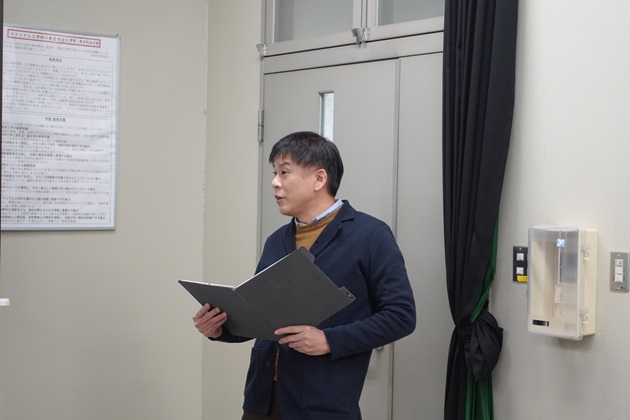
Prof. Yoji MINE (FAST, Kumamoto University)
峯 洋二 教授 (大学院先端科学研究部)
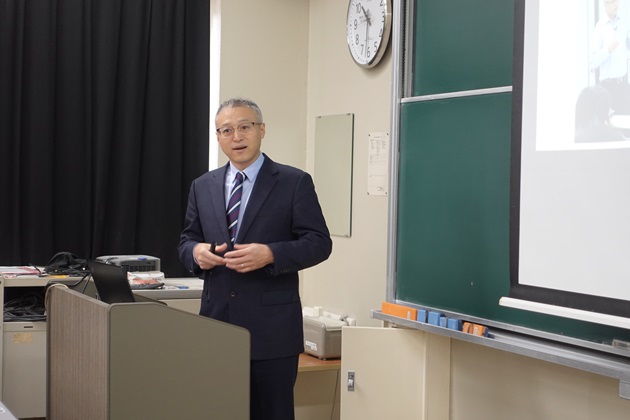
Prof. Yufeng ZHENG (Peking University, China)
鄭 玉峰 教授 (北京大学・中国)
■At Venue|会場の様子
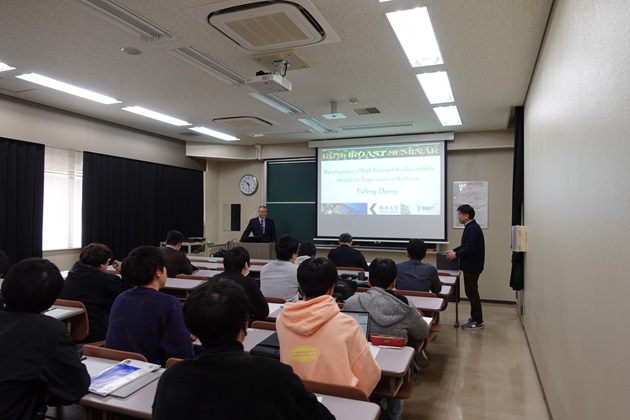
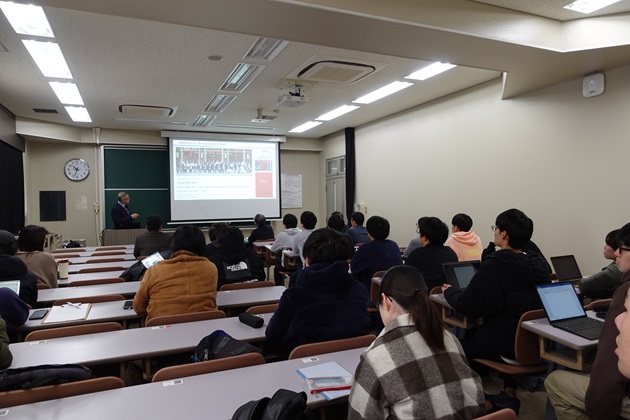
第137回IROASTセミナー開催のお知らせ
The 137th IROAST Seminar
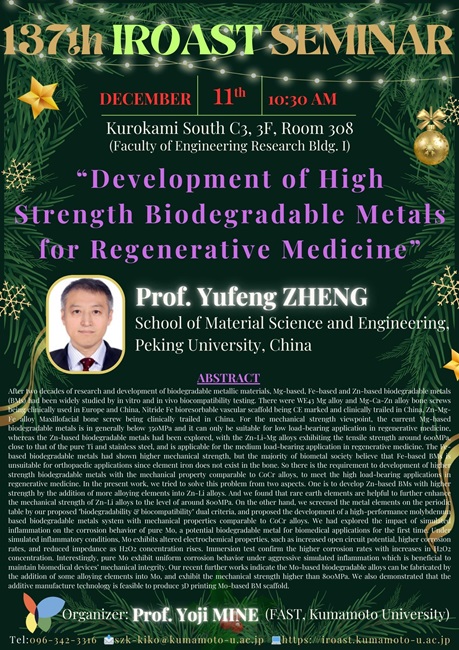
国際先端科学技術研究機構(IROAST)は、鄭 玉峰 卓越教授による、第137回IROASTセミナーを下記のとおり開催いたします。
興味のある方はどなたでもご参加いただけます。多くの皆さまのご参加をお待ちしております。
本セミナーは英語にて行います。事前登録は不要です。
1.日 時:令和6年12月11日(水)10:30~11:30
2.会 場:黒髪南C3 (工学部研究棟Ⅰ) 308講義室 59番
3.講演者・演題 (Speaker & Title):
Prof. Yufeng ZHENG (IROAST Distinguished Professor)
School of Material Science and Technology Engineering, Peking University, China
“Development of High Strength Biodegradable Metals for Regenerative Medicine”
4.概要 (Abstract) :
After two decades of research and development of biodegradable metallic materials, Mg-based, Fe-based and Zn-based biodegradable metals (BMs) had been widely studied by in vitro and in vivo biocompatibility testing. There were WE43 Mg alloy and Mg-Ca-Zn alloy bone screws being clinically used in Europe and China, Nitride Fe bioresorbable vascular scaffold being CE marked and clinically trailed in China, Zn-Mg-Fe alloy Maxillofacial bone screw being clinically trailed in China. For the mechanical strength viewpoint, the current Mg-based biodegradable metals is in generally below 350MPa and it can only be suitable for low load-bearing application in regenerative medicine, whereas the Zn-based biodegradable metals had been explored, with the Zn-Li-Mg alloys exhibiting the tensile strength around 600MPa, close to that of the pure Ti and stainless steel, and is applicable for the medium load-bearing application in regenerative medicine. The Fe-based biodegradable metals had shown higher mechanical strength, but the majority of biometal society believe that Fe-based BMs is unsuitable for orthopaedic applications since element iron does not exist in the bone. So there is the requirement to development of higher strength biodegradable metals with the mechanical property comparable to CoCr alloys, to meet the high load-bearing applications in regenerative medicine. In the present work, we tried to solve this problem from two aspects. One is to develop Zn-based BMs with higher strength by the addition of more alloying elements into Zn-Li alloys. And we found that rare earth elements are helpful to further enhance the mechanical strength of Zn-Li alloys to the level of around 800MPa. On the other hand, we screened the metal elements on the periodic table by our proposed "biodegradability & biocompatibility" dual criteria, and proposed the development of a high-performance molybdenum based biodegradable metals system with mechanical properties comparable to CoCr alloys. We had explored the impact of simulated inflammation on the corrosion behavior of pure Mo, a potential biodegradable metal for biomedical applications for the first time. Under simulated inflammatory conditions, Mo exhibits altered electrochemical properties, such as increased open circuit potential, higher corrosion rates, and reduced impedance as H2O2 concentration rises. Immersion test confirm the higher corrosion rates with increases in H2O2 concentration. Interestingly, pure Mo exhibit uniform corrosion behavior under aggressive simulated inflammation which is beneficial to maintain biomedical devices’ mechanical integrity. Our recent further works indicate the Mo-based biodegradable alloys can be fabricated by the addition of some alloying elements into Mo, and exhibit the mechanical strength higher than 800MPa. We also demonstrated that the additive manufacture technology is feasible to produce 3D printing Mo-based BM scaffold.
5.世話人: 峯 洋二 教授 (大学院先端科学研究部)
Email:mine@msre.kumamoto-u.ac.jp)
【IROASTセミナーに関するお問合せ】
平川
Email: szk-kiko@jimu.kumamoto-u.ac.jp
IROAST will have the 137th IROAST Seminar by IROAST Distinguished Professor Yufeng ZHENG, as follows.
Anyone interested in this seminar is more than welcome. Registration is not required.
We hope to see you at the seminar.
- Date and time: December 11 (Wednesday), 2024, 10:30-11:30
- Venue: Kurokami South C3, 3F, Room 308 (Faculty of Engineering Research Bldg. I)
- Speaker, Title & Abstract: Referred to above
- Organizer: Prof. Yoji MINE (FAST, Kumamoto University)
E-mail: mine@msre.kumamoto-u.ac.jp - Remarks: This seminar will be held in English.
IROAST Seminar inquiries:
Hirakawa (Ms.)
szk-kiko@jimu.kumamoto-u.ac.jp

